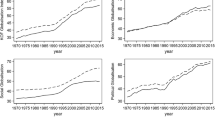Abstract
This paper examines the impact of national wealth, income distribution, government size, and four cultural variables on the perceived level of corruption in a country. The study finds that corruption is significantly correlated to GNP per capita, power distance, masculinity, and uncertainty avoidance. Significant interaction effects occur in collectivistic and high power-distance countries. Suggestions for future research are developed.
Similar content being viewed by others
Author information
Authors and Affiliations
Additional information
*Bryan W. Husted is Professor of Management at the Instituto Tecnologico y de Estudios Superiores de Monterrey (ITESM) in Monterrey, Mexico and the Alumni Association Chair of Business Ethics at the Instituto de Empresa in Madrid, Spain. His current research focuses on international business ethics and corporate social strategy.
Rights and permissions
About this article
Cite this article
Husted, B. Wealth, Culture, and Corruption. J Int Bus Stud 30, 339–359 (1999). https://doi.org/10.1057/palgrave.jibs.8490073
Published:
Issue Date:
DOI: https://doi.org/10.1057/palgrave.jibs.8490073




